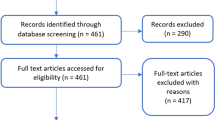Abstract
Intelligent Tutoring Systems have been shown to be very effective in supporting learning in domains such as mathematics, physics, computer programming, etc. However, they are yet to achieve similar success in tutoring metacognition. While an increasing number of educational technology systems support productive metacognitive behavior within the scope of the system, few attempt to teach skills students need to become better future learners. To that end, we offer a set of empirically-based design principles for metacognitive tutoring. Our starting point is a set of design principles put forward by Anderson et al. (Journal of the Learning Sciences, 4:167–207, 1995) regarding Cognitive Tutors, a family of Intelligent Tutoring Systems. We evaluate the relevance of these principles to the tutoring of help-seeking skills, based on our ongoing empirical work with the Help Tutor. This auxiliary tutor agent is designed to help students learn to make effective use of the help facilities offered by a Cognitive Tutor. While most of Anderson’s principles are relevant to the tutoring of help seeking, a number of differences emerge as a result of the nature of metacognitive knowledge and of the need to combine metacognitive and domain-level tutoring. We compare our approach to other metacognitive tutoring systems, and, where appropriate, propose new guidelines to promote the discussion regarding the nature and design of metacognitive tutoring within scaffolded problem-solving environments.



Similar content being viewed by others
References
Aleven, V., & Koedinger, K. R. (2000). Limitations of student control: Do students know when they need help? In G. Gauthier, C. Frasson, & K. VanLehn (Eds.), Proceedings of the 5th International Conference on Intelligent Tutoring Systems (pp. 292–303). Berlin: Springer.
Aleven, V., & Koedinger, K. R. (2002). An effective metacognitive strategy: Learning by doing and explaining with a computer-based Cognitive Tutor. Cognitive Science, 26, 147–179.
Aleven, V., McLaren, B. M., Roll, I., & Koedinger, K. R. (2006). Toward meta-cognitive tutoring: A model of help seeking with a Cognitive Tutor. International Journal of Artificial Intelligence in Education, 16, 101–128.
Aleven, V., Roll, I., McLaren, B. M., Ryu, E. J., & Koedinger, K. R. (2005). An architecture to combine meta-cognitive and cognitive tutoring: Pilot testing the Help Tutor. In Proceedings of 12th International Conference on Artificial Intelligence in Education (pp. 17–24). Amsterdam, The Netherlands: IOS.
Aleven, V., Stahl, E., Schworm, S., Fischer, F., & Wallace, R. M. (2003). Help seeking and help design in interactive learning environments. Review of Educational Research, 73(2), 277–320.
Anderson, J. R., Corbett, A. T., Koedinger, K. R., & Pelletier, R. (1995). Cognitive tutors: Lessons learned. Journal of the Learning Sciences, 4(2), 167–207.
Azevedo, R. (2005a). Using hypermedia as a metacognitive tool for enhancing student learning? The role of self-regulated learning. Educational Psychologist, 40(4), 199–209.
Azevedo, R. (2005b). Computer environments as metacognitive tools for enhancing learning. Educational Psychologist, 40(4), 193–197.
Azevedo, R., Cromley, J. G., & Seibert, D. (2004). Does adaptive scaffolding facilitate students ability to regulate their learning with hypermedia? Contemporary Educational Psychology, 29, 344–370.
Baker, R. S., Corbett, A. T., Koedinger, K. R., & Wagner, A. Z. (2004). Off-task behavior in the Cognitive Tutor classroom: When students “game the system.” In ACM CHI 2004: Computer–Human Interaction (pp. 383–90).
Baker, R. S. J. d., Corbett, A. T., Koedinger, K. R., Evenson, E., Roll, I., Wagner, A. Z., et al. (2006a). Adapting to when students game an intelligent tutoring system. In 8th International Conference on Intelligent Tutoring Systems (pp. 392–401). Berlin: Springer.
Baker, R. S. J. d., Corbett, A. T., Koedinger, K. R., & Roll, I. (2006b). Generalizing detection of Gaming the System across a tutoring curriculum. In 8th International Conference on Intelligent Tutoring Systems (pp. 402–11). Berlin: Springer.
Bielaczyc, K., Pirolli, P. L., & Brown, A. L. (1995). Training in self-explanation and self-regulation strategies: Investigating the effects of knowledge acquisition activities on problem solving. Cognition and Instruction, 13(2), 221–252.
Biswas, G., Leelawong, K., Kadira, B., Viswanath, K., Vye, N., Schwartz, D. L., et al. (2004). Incorporating self regulated learning techniques into learning by teaching environments. In The Twenty Sixth Annual Meeting of the Cognitive Science Society (pp. 120–125).
Bransford, J. D., Brown, A. L., & Cocking, R. R. (2000). How people learn: Brain, mind, experience, and school. Washington, DC: National Academy Press.
Brown, A. (1987). Metacognition, executive control, self-regulation, and other more mysterious mechanisms. In F. Reiner, & R. Kluwe (Eds.), Metacognition, motivation, and understanding (pp. 65–116). Hillsdale, NJ: Erlbaum.
Bunt, A., & Conati, C. (2003). Probabilistic student modelling to improve exploratory behavior. User Modeling and User-Adapted Interaction, 13(3), 269–309.
Carver, S. M. (2001). Cognition and instruction: Enriching the laboratory school experience of children, teachers, parents, and undergraduates. In S. M. Carver, & D. Klahr (Eds.), Cognition and instruction: Twenty-five years of progress (pp. 385–426). Mahwah, NJ: Erlbaum.
Carver, S. M., & Mayer, R. E. (1998). Learning and transfer of debugging skills: Applying task analysis to curriculum design and assessment. In Teaching and Learning Computer Programming: Multiple Research Perspectives (pp. 259–97). Hillsdale, NJ: Erlbaum.
Conati, C., & VanLehn, K. (1999). Teaching meta-cognitive skills: Implementation and evaluation of a tutoring system to guide self-explanation while learning from examples. In Artificial Intelligence in Education (pp. 297–304). Amsterdam, The Netherlands: IOS.
Corbett, A. T., & Anderson, J. R. (1995). Knowledge tracing: Modeling the acquisition of procedural knowledge. User Modeling and User-Adapted Interaction, 4, 253–278.
Corbett, A. T., & Anderson, J. R. (2001). Locus of feedback control in computer-based tutoring: Impact on learning rate, achievement and attitudes. In J. Jacko, A. Sears, M. Beaudouin-Lafon, & R. Jacob (Eds.), CHI’2001 Conference on Human Factors in Computing Systems (pp. 245–52). New York: ACM.
de Jong, T., & van Joolingen, W. R. (1998). Scientific discovery learning with computer simulations of conceptual domains. Review of Educational Research, 68, 179–201.
Del Solato, T., & du Boulay, B. (1995). Formalization and implementation of motivational tactics in tutoring systems. Journal of Artificial Intelligence in Education, 6(4), 337–378.
Gama, C. (2004). Metacognition in interactive learning environments: The reflection assistant model. In 7th Conference on Intelligent Tutoring Systems (pp. 668–677). Berlin: Springer.
Koedinger, K. R., Anderson, J. R., Hadley, W. H., & Mark, M. A. (1997). Intelligent tutoring goes to school in the big city. International Journal of Artificial Intelligence in Education, 8, 30–43.
Koedinger, K. R., & Corbett, A. T. (2006). Cognitive tutors: Technology bringing learning science to the classroom. In K. Sawyer (Ed.), The Cambridge Handbook of the Learning Sciences (pp. 61–78). Cambridge University Press.
Luckin, R., & Hammerton, L. (2002). 6th International Conference on Intelligent Tutoring Systems. Getting to know me: Helping learners understand their own learning needs through metacognitive scaffolding. Berlin: Springer.
Mathan, S. A., & Koedinger, K. R. (2005). Fostering the intelligent novice: Learning from errors with metacognitive tutoring. Educational Psychologist, 40(4), 257–265.
Morgan, P., & Ritter, S. (2002). An experimental study of the effects of cognitive tutor algebra I on student knowledge and attitude. Pittsburgh, PA: Carnegie Learning, Inc.
Quintana, C., Zhang, M., & Krajcik, J. (2005). A framework for supporting metacognitive aspects of online inquiry through software-based scaffolding. Educational Psychologist, 40(4), 235–244.
Razzaq, L., Feng, M., Nuzzo-Jones, G., Heffernan, N. T., & Koedinger, K. R. (2005). The Assistment project: Blending assessment and assisting. In The 12th International Conference on Artificial Intelligence In Education (pp. 555–62). Amsterdam: IOS.
Reif, F., & Scott, L. A. (1999). Teaching scientific thinking skills: Students and computers coaching each other. American Journal of Physics, 67(9), 819–831.
Resnick, L. B. (1987). Education and learning to think. Washington: National Academy Press.
Roll, I., Aleven, V., McLaren, B. M., & Koedinger, K. R. (2007). Can help seeking be tutored? Searching for the secret sauce of metacognitive tutoring. In Proceedings of the 13th International Conference on Artificial Intelligence in Education (pp. 203–210). Amsterdam, The Netherlands: IOS.
Roll, I., Aleven, V., McLaren, B. M., Ryu, E., Baker, R. S., & Koedinger, K. R. (2006). The Help Tutor: Does metacognitive feedback improve students’ help-seeking actions, skills and learning? In 8th International Conference in Intelligent Tutoring Systems (pp. 360–369). Berlin: Springer.
Roll, I., Baker, R. S., Aleven, V., McLaren, B. M., & Koedinger, K. R. (2005). Modeling students’ metacognitive errors in two intelligent tutoring systems. In user modeling 2005 (pp. 379–388). Berlin: Springer.
Schoenfeld, A. H. (1992). Learning to think mathematically: Problem solving, metacognition, and sense-making in mathematics. In D. Grouws (Ed), Handbook of research on mathematics teaching and learning (pp. 334–370). New York: MacMillan.
White, B. Y., & Frederiksen, J. R. (1998). Inquiry, modeling, and metacognition: Making science accessible to all students. Cognition and Instruction, 16(1), 3–118.
Wood, H. A., & Wood, D. J. (1999). Help seeking, learning, and contingent tutoring. Computers and Education, 33(2), 153–169.
Acknowledgments
We would like to thank Ryan deBaker, Eunjeong Ryu, Jo Bodnar, Ido Jamar, Brett Leber, Jonathan Sewall, Mike Konieczki, Kathy Dickensheets, Grant McKinney, Terri Murphy, Sabine Lynn, Dale Walters, Kris Hobaugh and Christy McGuire for their help carrying out these studies. This research is sponsored by NSF Award IIS-0308200, the Graduate Training Grant awarded to Carnegie Mellon University by the Department of Education (# R305B040063), and NSF Award SBE-0354420 to the Pittsburgh Sciences of Learning Center. The contents of the paper are solely the responsibility of the authors and do not necessarily represent the official views of the NSF.
Author information
Authors and Affiliations
Corresponding author
Rights and permissions
About this article
Cite this article
Roll, I., Aleven, V., McLaren, B.M. et al. Designing for metacognition—applying cognitive tutor principles to the tutoring of help seeking. Metacognition Learning 2, 125–140 (2007). https://doi.org/10.1007/s11409-007-9010-0
Received:
Accepted:
Published:
Issue Date:
DOI: https://doi.org/10.1007/s11409-007-9010-0




